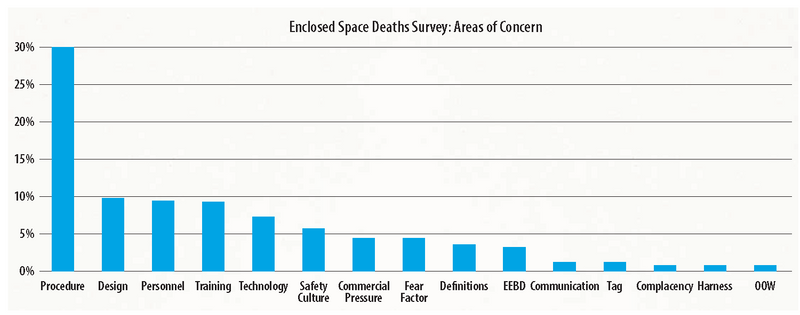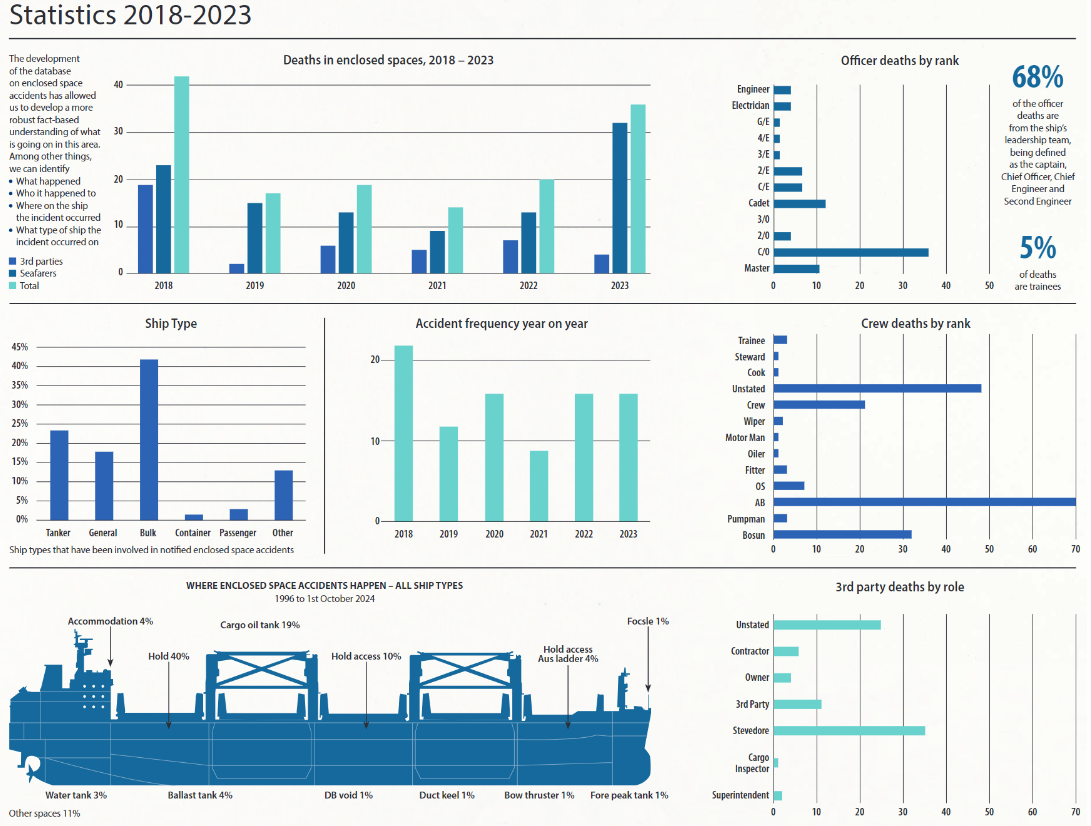Seaways Free Article: Enclosed spaces
We are starting to get more reliable information about why people die in enclosed spaces on board ship. But how do we stop it?
By Capt Garry Hallett, InterManager
Back to where we started?
In 2018 InterManager posed one simple question to the shipping industry:
"Why do we die in enclosed spaces?"
4968 seafarers responded expressing their views and opinions, which Intermanager then used to shape its response to the issue. And yet, for all that we have learnt, and for all the changes that we have made, people are still dying.
The rest of the article will look at what changes we are making, and what more we can do, but first, let’s see what we learnt from the previous survey.
What did we learn?
InterManager collated all four thousand nine hundred responses and used this data in planning their actions to address this specific issue for the next few years.
The key areas of concern highlighted in the survey are shown in the graphic to the right.

The survey indicated that there is a widespread belief that seafarers and third parties are still dying while entering or working in enclosed spaces onboard vessels because there is insufficient understanding throughout the shipping industry of the risks involved.
It revealed a perception that safety improvements do not happen because shipping industry investigations encourage a culture of blame, rather than a culture of learning. Ill-considered and unrealistic timeframes for the completion of complex hazardous tasks also put at-risk staff under unnecessary additional pressure.
InterManager Secretary General, Captain Kuba Szymanski, said: ‘Unfortunately, people are now so used to the situation that it is extremely difficult to challenge their point of view. Seafarers, and more importantly ship managers, are not thinking outside of the box.’
Moving forward
InterManager went on to take the lead with the IMO’s Human Element Industry Group, HEIG, and championed the pathway to address these serious issues.
One major outcome of the survey was InterManager’s decision to establish a comprehensive industry database to capture and analyse all verified enclosed space accidents attributable to asphyxiation or poisoning (excluding fire, explosion, fall and drowning). By analysing the enclosed space accidents, InterManager has been able to develop a fact-based overview of what has been occurring. This gives us the basis to understand, within the limitations of the investigations undertaken, what has happened and what has been recommended to address the continued accidents.
Specifically, we can now identify
- How many people have been dying in enclosed spaces
- Where onboard ship these types of accidents have been occuring,
- The number of people dying in each accident
- Who the victimes are and their role on board, either as ship crews or third partieis working onboard
This information has been promulgated to the IMO through the relevant committee and sub committees, in order that others may benefit from the work undertaken. It has been used in the revision of Assembly Resolution A1050(27), Recommendations on entering enclosed spaces aboard ships. Having fact-based observations to drive the changes necessary will in turn mitigate some of the known risks. The revision of this Assembly Resolution is expected to be finalised in mid-2025.
What can we do?
It became very apparent from the output of the 2018 survey that no single action can address the complexity of the hazards of entering enclosed spaces onboard ships. The following major work streams were identified as mid to long term actions:
Engineering Solutions
Action: Engineer out the need to enter enclosed spaces and design enclosed spaces facilitating safe access, occupancy, and egress.
Status: The Institute of Marine Engineering, Science and Technology (IMarEST) led work in the systematic analysis of enclosed spaces, their risks and mitigations.
Leadership and the human element
Action: Embed in all aspects of the marine industry the appropriate style of leadership to match the need at that moment. Create leaders afl oat and ashore who are empowered to make the correct risk-based decisions which ensure the safety of all impacted by those decisions. Recognise when an authoritarian style of leadership is required and where a more collaborative style is necessary. Listen to those involved in doing the work and provide sufficient time for that work to be done competently and safely without undue pressure. Fully appreciate the human element on board ship and ashore when making decisions that impact others.
A full revision of the ISM code
Action: Understand the need for clear, unambiguous procedures, practices and policies that build into an effective safety management system applicable to those on board ships and ashore. This system must be understandable by those who undertake the work and offer the required safety barriers to protect all from harm. It must be periodically reviewed both internally, by those who use it, and externally, by those who write it, and be assessed by the authorities to their satisfaction and in compliance with the statutory and ethical rights of the workers.
We need a standard that correctly identifi es those requesting work to be undertaken onboard ship, and those who are obliged to undertake that work. It must define where accountability and responsibility actually sit.
Status: The HEIG has worked with other organisations to promote the review of the ISM code, recognising this is required not only to address the concerns within enclosed space accidents but also many other aspects of modern ship management and operation.
Revision of STCW and the identification of educational gaps
Action: Provide ship’s crews with the correct education and complementary training throughout their careers to support decision-making when identifying, entering and managing emergency situations within an enclosed space.
Status: The IMO has commenced the early stage initial review and revision of the STCW 2010 code. The International Chamber of Shipping (ICS) has undertaken a review of the current STCW code and the delivery of enclosed space training. It will submit a paper to the IMO outlining the gaps and identifying training needs.
Research and data analysis
Action: Collate all available information relating to accidents within enclosed spaces attributable to asphyxiation or poisoning. Continue to request information on enclosed space accidents from those best able to provide it, to support the learning and data analysis goals and prevent reoccurrence of accidences.
Status: InterManager has developed a comprehensive database capturing all notifi ed enclosed space accidents since 1996. The content can be interrogated from many aspects, whether ship related e.g. ship type, age, flag, class P&I club, owner and manager, cargo carried; person related e.g. number of persons involved, rank, where the accident happened, or by the recommendations from the investigation, if available
Pressing for improvement in transparency when an accident occurs
Action: Allow free and unimpeded notification when an accident happens. Promote the importance of timeliness when initially reporting an accident and the positive benefits to industry of learning from others.
Status: InterManager continues to approach flag states
and marine investigation branches when enclosed space
accidents have happened but have not yet been recorded in the accident modules of GISIS, or elsewhere as required by national or regional regulations.
Incdent notification, tracking and investigation
Action: Promote at the highest level the early reporting of accidents so the accident data is as current as possible. Facilitate quick learning or trend identifi cation at the earliest opportunity. We aim for considerate and complete investigation of accidents that fully explores why the accident happened, identifies the root cause(s) and develops actions to prevent reoccurrence, wherever those actions may lie and no matter how uncomfortable they may be.
Status: InterManager continues to make submissions to the relevant sub committees of the IMO highlighting when the guidelines have been followed and the impact when they have not, including the unacceptable delay between accident occurring, notification and completion of investigation.

How you can help
That’s where we are as an industry. Much work is being done, with much more still to do.
Six years have passed since the original survey and deaths in enclosed spaces onboard ships are still being reported and recorded.
With this in mind, it is important to us to listen to those working on board ships today, to fi nd out your thoughts and see if we are on the correct path to prevent this reoccurring accident. Ultimately, we want to make the ship you work on a safer environment for you, and for everyone – in a way that works for you.
We have two requests:
- If you know of an enclosed space accident, please tell InterManager in confi dence using the email [email protected] stating the ships name, IMO number if known, date of accident and a brief summary.
- Keep an eye out for our survey and webinar which will look into current practices in greater detail. It’s a quick-fi re set of yes or no questions, with space to expand your answers if you wish. We want to know how things work now, and how we can make them better.
And then one day, perhaps we can finally stop asking
"Why do people still die in enclosed spaces on board ships?"
